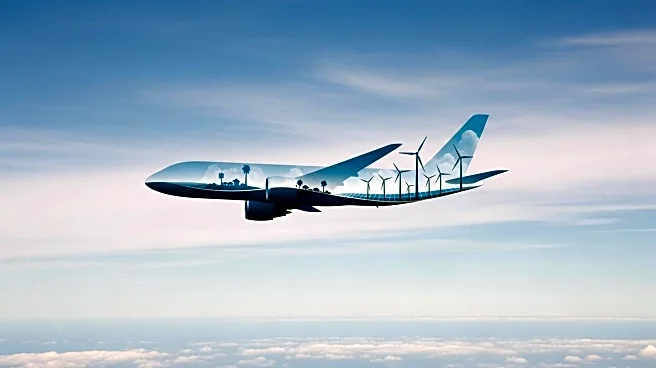What is the story about?
What's Happening?
The aviation industry is increasingly focusing on the environmental impact of non-carbon dioxide (CO2) emissions, particularly contrails, which are visible trails left by aircraft in the sky. These contrails, formed when aircraft pass through Ice Super Saturated Regions, can develop into cirrus clouds that have a warming effect on the planet. The European Union has mandated airlines to report non-CO2 emissions as part of its Emissions Trading System, initially for flights within the European Economic Area, Switzerland, and the UK. This requirement will expand to flights to third countries by 2027. Despite the challenges in measuring and mitigating these emissions, various research initiatives are underway to better understand and reduce their impact.
Why It's Important?
Addressing non-CO2 emissions is crucial for the aviation industry's environmental strategy, as these emissions contribute significantly to climate change. The focus on contrails is particularly important because they have a net warming effect, especially at night. The industry's efforts to mitigate these emissions could lead to significant reductions in aviation's overall climate impact. However, the lack of precise measurement tools and commercially viable solutions poses challenges. The industry's ability to adapt and innovate in this area could influence regulatory approaches and market dynamics, potentially affecting airline operations and connectivity.
What's Next?
The aviation industry is expected to continue its research and development efforts to better understand and mitigate non-CO2 emissions. This includes exploring the use of sustainable aviation fuels and new technologies to reduce contrail formation. The EU's regulatory framework will likely evolve as more data becomes available, potentially influencing global standards. Airlines and industry stakeholders will need to collaborate on solutions that balance environmental goals with operational efficiency. The ongoing research and trials, such as those conducted by Airbus and GE Aerospace, will play a critical role in shaping future strategies.
Beyond the Headlines
The focus on non-CO2 emissions highlights the broader challenge of balancing environmental sustainability with economic and operational considerations in the aviation industry. The ethical implications of climate change and the industry's responsibility to mitigate its impact are significant. As public awareness and regulatory pressure increase, airlines may face reputational risks if they fail to address these issues effectively. The industry's response could also influence public perception and policy decisions related to climate change and environmental protection.
















